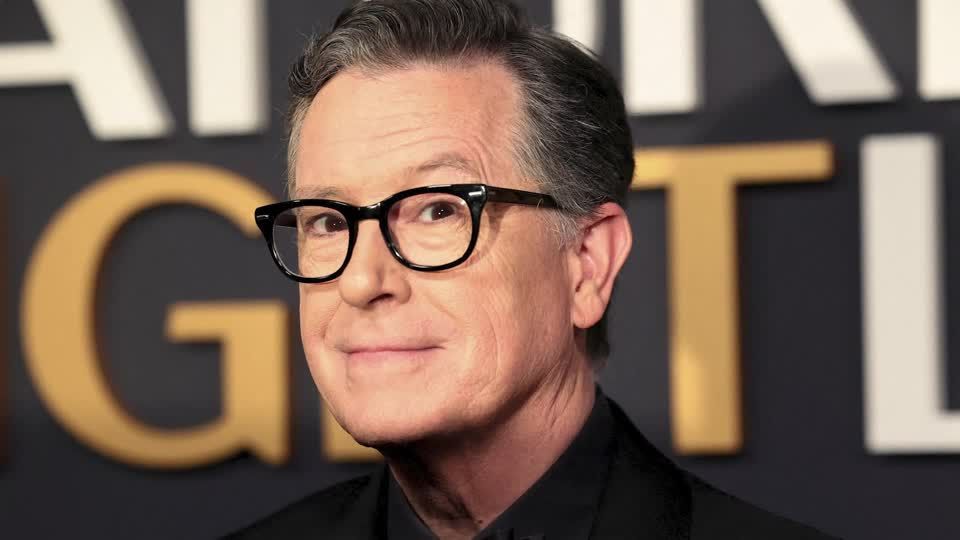Late-Night TV’s Fiercest Rivals Do the Unthinkable — After Stephen Colbert’s Sudden Cancellation, Competitors Refuse to Celebrate
In a moment that defied television history, the world of late-night comedy witnessed an unprecedented act of solidarity. Stephen Colbert, recently and abruptly ousted from _The Late Show_ in a move that stunned fans and industry insiders alike, returned to the very stage where he once delivered nightly monologues. But this time, he wasn’t there to perform—he was there to be honored by the unlikeliest group of supporters: his fiercest late-night rivals.
Jimmy Fallon, Seth Meyers, John Oliver, Trevor Noah, and Jimmy Kimmel—hosts who once competed for ratings and headlines—joined Colbert under the spotlight for a segment already being described as “the most powerful moment in late-night television history.” The camera panned to an empty audience. The usual laugh track was silent. The applause sign was off. There were no flashy graphics, no canned jokes—just six of the most influential voices in American comedy, sitting in a loose semicircle, speaking candidly about the seismic shift shaking their industry: the sudden, unexplained cancellation of _The Late Show_, and the deeper battle being waged behind closed doors.
What unfolded was not just support for a colleague, but a passionate call to action.
“We Weren’t Supposed to Be Here Together”
Jimmy Fallon broke the silence.
“We weren’t supposed to be here together,” he said. “We’ve done sketches, we’ve poked fun at each other, but we’ve also competed—sometimes like our jobs depended on it. But this? This is bigger than all that.”
Seth Meyers nodded.
“When a voice like Stephen’s gets cut off overnight without explanation, we have to ask why. And we have to ask who’s next.”
The Cancellation That Raised Red Flags
Colbert’s departure from _The Late Show_ was abrupt and suspicious. There was no farewell episode, no formal announcement from CBS—just a leaked internal memo citing “restructuring” and “realignment of late-night resources.”

But sources close to the show painted a darker picture. Network executives, under pressure from corporate sponsors and political operatives, grew uncomfortable with Colbert’s increasingly fearless commentary. Insiders say he crossed an invisible line during a recent monologue, where he lambasted both left-wing hypocrisy and right-wing extremism in a scathing, unedited ten-minute segment.
That segment quickly went viral, but also reportedly triggered backlash from advertisers and political allies of the network’s ownership.
A former CBS staffer told Variety:
“Colbert started digging where they didn’t want him to dig. He wasn’t just making jokes anymore. He was challenging power—and power pushed back.”
“This Is About All of Us”
Trevor Noah, who returned to the U.S. specifically for this appearance, put it bluntly:
“This isn’t just about Stephen. This is about all of us. Every single one of us has said things that made someone uncomfortable. That’s our job. That’s what comedy is supposed to do. If one of us can be silenced, then all of us are at risk.”
John Oliver added:
“Comedy has always been a form of dissent. When the people holding the purse strings start dictating the punchlines, we lose something essential—not just as comedians, but as a culture.”
A New Kind of Solidarity
While late-night hosts have occasionally collaborated on charity events or social causes, never before have they stood united like this on the same stage—not to roast, but to resist. The segment wasn’t just a tribute; it was a statement of solidarity against a system they say is increasingly hostile to independent thought.
Jimmy Kimmel summed it up:
“People think late-night is just about jokes. But we’re also mirrors. And sometimes people don’t like what they see in the mirror. So they break it.”
What Comes Next?
As this unscripted moment spread across social media and YouTube, reactions were swift and passionate. #JusticeForColbert and #LateNightUnite began trending within minutes. Celebrities, politicians, and fans weighed in—many demanding that CBS explain its decision, others questioning the growing influence of corporate interests in what used to be one of the last strongholds of honest satire.
Meanwhile, whispers of a new, independent late-night platform are growing louder. Rumors suggest Colbert, Jon Stewart, and possibly some of the hosts onstage are exploring content ventures free from corporate oversight. Streaming giants like Amazon and YouTube are reportedly already in talks.

The Final Words
Before the show faded to black, Colbert—who had remained silent for most of the segment—finally spoke.
“I’m grateful,” he said quietly. “Not just for these friends. But for the audience out there who still wants to laugh and think. If speaking truth gets me kicked off a stage, I’ll just build a new one.”
He smiled, bittersweet.
“And this time, we’ll make it too big to cancel.”
In a single, unscripted moment, late-night’s fiercest rivals became allies, sending a message that reverberated far beyond the empty seats of the Ed Sullivan Theater: The fight for honest comedy, for truth, and for the freedom to dissent is far from over. And together, they are determined to keep that stage alive.
